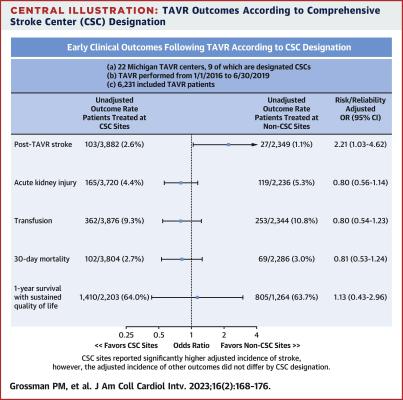
February 1, 2023 — A Michigan Medicine study suggests that hospitals without the highest stroke care designation may be missing strokes that occur after a common heart valve replacement procedure.
Researchers analyzed outcomes of more than 6,200 transcatheter aortic valve replacements performed at 22 Michigan hospitals between 2016 and mid-2019 using data from the Michigan Structural Heart Consortium. The study zeroed in on identification of stroke after TAVR, a minimally invasive procedure to replace a thickened aortic valve with a manmade one, at health systems with and without certification by the Joint Commission as a comprehensive stroke center, the highest certification for acute stroke care.
The findings, published in JACC: Cardiovascular Interventions, reveal that comprehensive stroke centers reported significantly greater rates of stroke up to 30 days after TAVR — 2.21 times higher than hospitals without the designation.
The numbers raise two questions. First: are hospitals with stroke center status finding more strokes because they take care of sicker, more complex patients? Or are they not performing TAVR at the level of those without such status?
But after adjusting for patient characteristics, such as heart function and lung disease, and comparing other meaningful clinical outcomes after TAVR, like mortality and renal failure, investigators found no significant differences in other clinically important outcomes outside of stroke detection.
A possible explanation for this finding is that patients receiving TAVR at high-level stroke centers are not having more strokes, rather that hospitals with this status are better at detecting them, particularly smaller strokes, said senior author Michael Grossman, M.D., an interventional cardiologist at the University of Michigan Health Frankel Cardiovascular Center and a professor of cardiology at U-M Medical School,
“This becomes an issue because stroke has been suggested as a nationally and publicly reported outcome measure for TAVR,” Grossman said. “Based on this data, stroke is not indicative of a universal quality issue. A death is a death. A transfusion is a transfusion. Stroke detection is inconsistent, and that variability will potentially put high-level stroke centers at a disadvantage in those quality measures.”
Comprehensive stroke center status signifies an organization’s capabilities and resources for integrated acute stroke management and care. Such centers have staff specifically trained in recognizing signs of stroke, diagnosing it and activating systems of care to treat those patients.
These high-level centers were also more likely to participate in clinical trials for TAVR, which have reported higher rates of stroke up to 30 days after TAVR — between 3.4% and 6.1% — than the national average of 2.3% reported in the Society of Thoracic Surgeons/American College of Cardiology TVT Registry.
This is an extremely important study because it shows that TAVR sites with high-level stroke designation have a higher incidence of recognizing, diagnosing and accurately reporting stroke to the TVT Registry, said co-author G. Michael Deeb, M.D., a thoracic surgeon at the U-M Health Frankel Cardiovascular Center and a professor of thoracic surgery at U-M Medical School.
“The national TVT Registry uses a composite score which includes the incidence of stroke to rank the quality of care at all United States TAVR sites,” Deeb said. “Those sites with high-level stroke designation are penalized by the composite endpoint since sites with lower-level stroke designation may be underreporting the incidence of stroke and, thus, have a better composite score and higher TAVR site quality rating.”
Hospitals that participate in TAVR clinical trials are adhering to more rigorous protocols used to assess neurologic outcomes, Grossman says, which would explain the higher rates of stroke detection.
“While these stroke rates are low overall, we need to be careful about how we are measuring quality for TAVR outcomes,” he said. “It could both punish sites that strive to mitigate stroke consequences and incentivize sites that are underreporting stroke rates after this procedure.”
TAVR is an alternative for patients with aortic stenosis who likely could not withstand surgical aortic valve replacement, an open-heart procedure that was the standard treatment for several years. Many of those patients would have no chance at survival before the minimally invasive procedure existed.
As of 2019, TAVR is now the dominant form of aortic valve replacement. That year, there were 72,991 TAVR cases, topping 57,626 cases of all forms of surgical replacement, according to data from the STS/ACC TVT Registry.
For more information: https://www.michiganmedicine.org/


 February 03, 2026
February 03, 2026 









